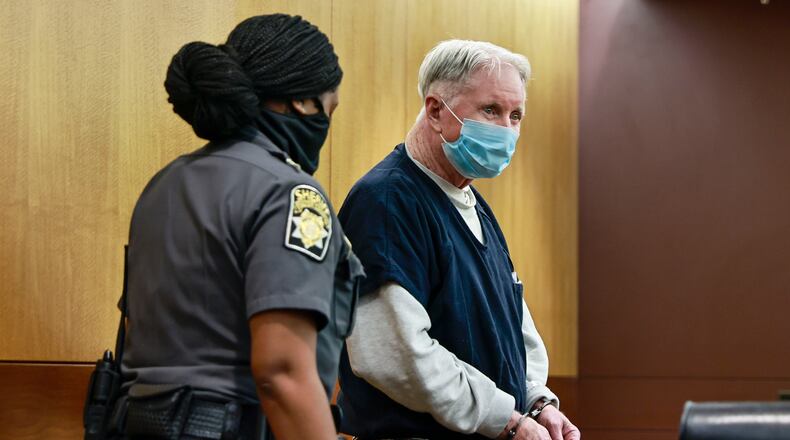Former attorney Claud “Tex” McIver must remain in custody while retried over the 2016 fatal shooting of his wife, an Atlanta judge has ruled.
McIver is set to stand trial for the second time on Dec. 4, having been found guilty of murdering corporate executive Diane McIver in September 2016. His conviction and life sentence were overturned in June 2022 by the Georgia Supreme Court, which determined the jury should have been allowed to consider a misdemeanor involuntary manslaughter charge.
“While defendant enjoys anew the presumption of innocence as to the counts of conviction that were reversed, he also carries with him a felony conviction for improperly seeking to influence a key witness in his case, a prior bond violation so serious the court revoked his bond, and weeks of evidence about his character and (mis)conduct,” Fulton County Superior Court Judge Robert C.I. McBurney wrote.
McIver, who went into the custody of the Fulton County Sheriff’s Office after being released from a prison near Savannah, made the bail request based on his stated need for medical examination and access to his lawyers.
Donald F. Samuel, one of McIver’s attorneys, said during a Nov. 8 hearing that McIver had experienced “a significant deterioration in mental acuity.” McIver, while competent, has problems remembering and communicating logically, Samuel said.
“Mr. McIver’s approaching 82,” Samuel told McBurney. “He’s suffering from the malady of old age.”
McBurney acknowledged that McIver “is no longer a spry young man” but said McIver’s age doesn’t afford him special treatment.
“He is, however, squarely in the prime age range for such important responsibilities as running for the Presidency of the United States and so should not be given any special dispensation due to his seniority,” the judge said.
Samuel did not detail McIver’s health problems, but said results of the medical exam could have a “huge impact” on the trial. He said the defense team would ensure McIver complied with bond conditions if released from the Fulton County jail in Alpharetta.
“You can put a monitoring device on both his ankles and wrists if you want to,” Samuel told the judge. “You can put a leash on him if you want to.”
McIver would be able to stay at an Atlanta apartment while on bond, Samuel said, acknowledging McBurney’s concern in October 2022 when McIver sought to stay with family in Texas. McBurney deemed McIver a flight risk and denied the request. Samuel offered on Nov. 8 to hire an armed guard to stand outside the apartment.
“We’ll take the phone out of the apartment,” Samuel said during the hearing. “We’ll make sure there’s no internet in the apartment. It’s just not necessary at this time to keep him locked up.”
Prosecutor Adam R. Abbate said Samuel’s concerns about McIver remaining in custody were unwarranted and that the bond request should be denied.
Abbate said the court could issue an order allowing McIver to receive his medical exam while under the sheriff’s control and to stay late at the court each day during trial to meet with his attorneys.
“I think the court’s been more than generous,” Abbate said. “Mr. McIver has basically had unfettered access to his counsel and people who are not his counsel. He’s the only defendant I’m aware of who has visits from friends and family.”
In his order, McBurney said he’d direct Fulton County’s medical providers to attend to McIver as needed. He found McIver a poor candidate for bond on the eve of retrial, though.
“The temptation to abandon this replay of the drama of his wife’s shooting death is simply too great,” he said.
Prosecutors allege McIver, who in 2016 was a partner at the Fisher Phillips law firm, murdered his 64-year-old wife to benefit financially. McIver contends he shot his wealthy wife by accident as they were being driven through Atlanta by her friend Dani Jo Carter. McIver claims he was holding his .38-caliber revolver for safety when it accidentally fired as he dozed off while seated directly behind his wife, who was in the front passenger seat.
The first time McIver stood trial, in March and April of 2018, he was acquitted of malice murder and found guilty of felony murder, aggravated assault, possession of a firearm during the commission of a felony, and influencing a witness.
McIver’s first trial involved almost 80 witnesses. The retrial, which could involve more than 50 prosecution witnesses and various defense witnesses, is expected to last at least two weeks, Samuel said. He said some of the defense strategies have changed and that “there’s going to be some changes in who is going to testify.”
Georgia’s high court accepted the surrender of McIver’s law license in April. He had been an attorney in Georgia since 1973.
About the Author
Keep Reading
The Latest
Featured


